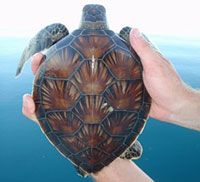Welcome to the USGS Terrestrial, Freshwater, and Marine Ecosystems Program
Civilization depends on life-support services that natural ecosystems perform, including regulating climate, mitigating floods and drought, protecting shorelines from erosion, purifying air and water, detoxifying and decomposing wastes, and pollinating crops and natural vegetation. Healthy ecosystems provide habitat for diverse fish and wildlife communities. Studies conducted by USGS Terrestrial, Freshwater, and Marine Ecosystems scientists describe factors that control ecosystem structure, function, condition, and the provision of goods and services. This information is used to predict future changes to ecosystems and to describe the results of management alternatives. Ecosystem science is thus used to restore degraded landscapes and freshwater systems, sustain plants and animals, and find means to adapt management to global change.
Major research components of the program include:
or see all research topics.
 |
|
|
| |
Research Highlights
Sea Turtles in the Dry Tortugas: Tracking Movements of Endangered Species in Florida's Coral-Reef Habitats
 |
| Above: One of the smallest juvenile green turtles captured thus far, August 2008, Dry Tortugas National Park. Photograph by Kristen Hart. |
Kristen Hart and Keith Ludwig of the USGS Florida Integrated Science Center (FISC) office in St. Petersburg participated in two research cruises in 2008 to study patterns of habitat use by endangered sea turtles in and around the National Park. The cruises were conducted in May and August 2008 on board the merchant vessel (M/V) Fort Jefferson. Hart and Ludwig used the ship's tender (the Livingston, a 14-ft center-console catamaran skiff with a 25-horsepower motor) as a workboat, exploring Florida's Coral-Reef habitats for
quantifying patterns of sea turtle habitat use, employing
capture-recapture and satellite- and acoustic-tracking techniques to determine the amount of time endangered sea turtles spend in and around the various "no fishing" zones of Dry Tortugas National Park.
The USGS will provide a more comprehensive understanding of endangered sea turtles' use of National Park resources over time through this research. Such information will be instructive in forming management strategies that benefit endangered species and the habitats and resources upon which they rely.
To learn more about the exploration of these coral-reef habitats, read the December 2008 Sound Waves article by Kristen Hart.
To learn more about the conservation status of sea turtles in the United States, visit the "Marine Turtles" Web site hosted by the National Oceanic and Atmospheric Administration (NOAA) Marine Fisheries Service's Office of Protected Resources. To learn more about Hart's studies of sea turtles, visit URL http://sofia.usgs.gov/people/hart.html. |
|
| |
|
 |
|
In the Spotlight
 Ecological Foundations for Fire Management: In a recent USFS publication (General Technical Report PNW-GTR-779), USGS scientist Jon Keeley led a team of scientists from various agencies and academic institutions in developing a framework that will inform fire management of ecosystems. This review uses a scientific synthesis to provide an ecological foundation for management of diverse ecosystems. Ecosystem-based management requires different strategies on different landscapes, necessitating a regional approach to fire management. Sustainable ecosystem-based management will be successful only if fire policy and management are 1) based on ecological principles, 2) integrated with other resource disciplines (wildlife, hydrology, silviculture, etc.), and 3) relevant for applications at large spatial and temporal scales. Fire is such a pervasive disturbance in ecosystems, that failure to include it as part of managing large landscapes will inevitably lead to unintended outcomes. (Jon Keeley, Three Rivers, CA, 559-565-3170) Citation: Keeley, J.E., G. Aplet, N.L. Christensen, S.G. Conard, E.A. Johnson, P.N. Omi, D.L. Peterson, and T.W. Swetnam. 2009. Ecological foundations for fire management in North American forest and shrubland ecosystems. General Technical Report PNW-GTR-779. Portland, OR: U.S. Department of Agriculture, Forest Service, Pacific Northwest Research Station. 92 p. Ecological Foundations for Fire Management: In a recent USFS publication (General Technical Report PNW-GTR-779), USGS scientist Jon Keeley led a team of scientists from various agencies and academic institutions in developing a framework that will inform fire management of ecosystems. This review uses a scientific synthesis to provide an ecological foundation for management of diverse ecosystems. Ecosystem-based management requires different strategies on different landscapes, necessitating a regional approach to fire management. Sustainable ecosystem-based management will be successful only if fire policy and management are 1) based on ecological principles, 2) integrated with other resource disciplines (wildlife, hydrology, silviculture, etc.), and 3) relevant for applications at large spatial and temporal scales. Fire is such a pervasive disturbance in ecosystems, that failure to include it as part of managing large landscapes will inevitably lead to unintended outcomes. (Jon Keeley, Three Rivers, CA, 559-565-3170) Citation: Keeley, J.E., G. Aplet, N.L. Christensen, S.G. Conard, E.A. Johnson, P.N. Omi, D.L. Peterson, and T.W. Swetnam. 2009. Ecological foundations for fire management in North American forest and shrubland ecosystems. General Technical Report PNW-GTR-779. Portland, OR: U.S. Department of Agriculture, Forest Service, Pacific Northwest Research Station. 92 p.
Additional Resource
 The Fire Research and Management Exchange System (FRAMES) The Fire Research and Management Exchange System (FRAMES)
is a "systematic method of exchanging information and transferring technology between wildland fire researchers, managers, and other stakeholders." FRAMES implements web-based technologies that assist in bridging the gap between science and management, making wildland fire data, metadata, tools, and other information resources easy to find, access, distribute, compare, and use.
|